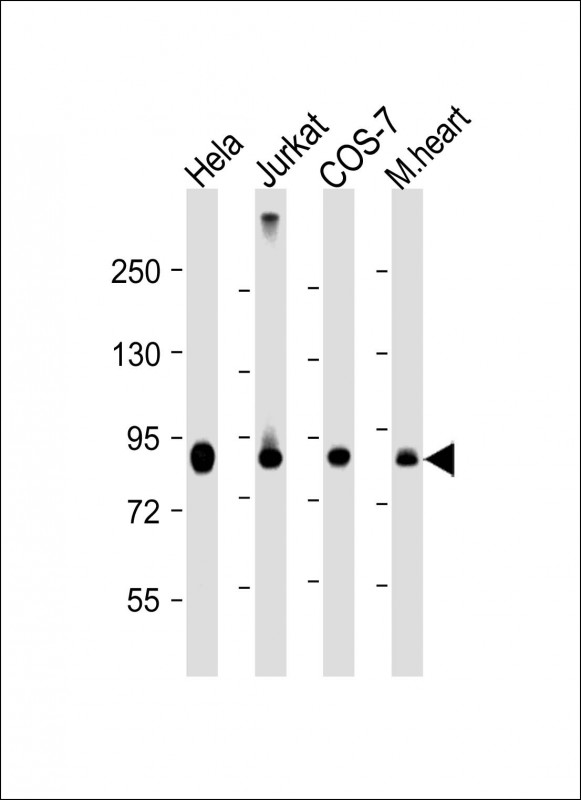
| WB | 1/2000 | Human,Mouse,Rat |
| IF | 咨询技术 | Human,Mouse,Rat |
| IHC | 咨询技术 | Human,Mouse,Rat |
| ICC | 技术咨询 | Human,Mouse,Rat |
| FCM | 咨询技术 | Human,Mouse,Rat |
| Elisa | 咨询技术 | Human,Mouse,Rat |
| Aliases | ATP-dependent 6-phosphofructokinase, platelet type {ECO:0000255|HAMAP-Rule:MF_03184}, ATP-PFK {ECO:0000255|HAMAP-Rule:MF_03184}, PFK-P, 2.7.1.11 {ECO:0000255|HAMAP-Rule:MF_03184}, 6-phosphofructokinase type C, Phosphofructo-1-kinase isozyme C, PFK-C, Phosphohexokinase {ECO:0000255|HAMAP-Rule:MF_03184}, PFKP, PFKF |
| Entrez GeneID | 5214 |
| WB Predicted band size | 85.6kDa |
| Host/Isotype | Mouse IgG1 |
| Antibody Type | Primary antibody |
| Storage | Store at 4°C short term. Aliquot and store at -20°C long term. Avoid freeze/thaw cycles. |
| Species Reactivity | Human, African Green Mouseonkey, Mouse |
| Immunogen | This PFKP antibody is generated from a mouse immunized with a recombinant protein between 40-300 amino acids from the C-terminal region of human PFKP. |
+ +
以下是3篇与PFKP抗体相关的参考文献及其摘要内容概览:
---
1. **文献名称**: *PFKP signaling at a glance: role in glucose metabolism and tumorigenesis*
**作者**: Lee JH, et al.
**摘要**: 该研究探讨PFKP(血小板型磷酸果糖激酶)在糖酵解中的调控作用及其与肿瘤生长的关联。作者通过Western blot和免疫组化实验,使用特异性PFKP抗体证明其在胶质母细胞瘤中高表达,并揭示其通过激活mTOR信号通路促进肿瘤细胞增殖。
---
2. **文献名称**: *Targeting PFKP as a novel therapeutic approach in HER2-positive breast cancer*
**作者**: Chen Y, et al.
**摘要**: 本文研究PFKP在HER2阳性乳腺癌中的功能,通过shRNA敲低和PFKP抗体检测,发现PFKP表达与患者预后不良相关。实验显示抑制PFKP可降低糖酵解活性并增强化疗敏感性,提示其作为治疗靶点的潜力。
---
3. **文献名称**: *Role of PFKP in skeletal muscle insulin resistance*
**作者**: Li X, et al.
**摘要**: 该文献利用PFKP特异性抗体进行免疫沉淀和免疫荧光分析,发现高脂饮食诱导的胰岛素抵抗模型中PFKP表达上调,并通过与IRS1相互作用抑制胰岛素信号通路,为代谢疾病的机制提供了新见解。
---
以上文献均通过PFKP抗体开展实验,涵盖肿瘤代谢、治疗靶点探索及代谢疾病机制等领域。
The platelet-type phosphofructokinase (PFKP) antibody is a research tool used to detect and study PFKP, a key glycolytic enzyme that catalyzes the phosphorylation of fructose-6-phosphate to fructose-1.6-bisphosphate, a rate-limiting step in glycolysis. PFKP is one of three PFK isoforms (PFKM, PFKL, PFKP) encoded by distinct genes, with tissue-specific expression patterns. PFKP is predominantly expressed in platelets, brain, and placenta, and plays a critical role in regulating cellular energy metabolism. It has gained attention in cancer research due to its overexpression in many tumors, where it supports the Warburg effect—a metabolic shift favoring glycolysis even under aerobic conditions—to fuel rapid cancer cell proliferation.
PFKP antibodies are widely used in techniques like Western blotting, immunohistochemistry (IHC), and immunofluorescence (IF) to assess PFKP expression levels, subcellular localization, and interactions in various biological contexts. Studies have linked PFKP to cancer progression, metabolic disorders, and neurological diseases. For instance, in glioblastoma, PFKP upregulation is associated with enhanced glycolysis and poor prognosis. Additionally, PFKP’s role in integrating metabolic and signaling pathways (e.g., PI3K/AKT/mTOR) highlights its potential as a therapeutic target. Researchers also use PFKP antibodies to explore isoform-specific functions, as cross-reactivity between PFK isoforms can complicate interpretation. These antibodies are typically generated using recombinant PFKP protein or synthetic peptides, with validation steps ensuring specificity. Overall, PFKP antibodies are indispensable for dissecting metabolic reprogramming in health and disease.
×